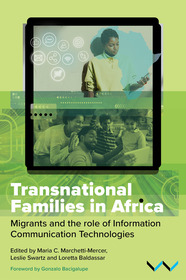
Transnational Families in Africa
Migrants and the Role of Information Communication Technologies
- Publisher's listprice GBP 14.99
-
7 161 Ft (6 820 Ft + 5% VAT)
The price is estimated because at the time of ordering we do not know what conversion rates will apply to HUF / product currency when the book arrives. In case HUF is weaker, the price increases slightly, in case HUF is stronger, the price goes lower slightly.
- Discount 20% (cc. 1 432 Ft off)
- Discounted price 5 729 Ft (5 456 Ft + 5% VAT)
Subcribe now and take benefit of a favourable price.
Subscribe
7 161 Ft

Availability
Estimated delivery time: In stock at the publisher, but not at Prospero's office. Delivery time approx. 3-5 weeks.
Not in stock at Prospero.
Why don't you give exact delivery time?
Delivery time is estimated on our previous experiences. We give estimations only, because we order from outside Hungary, and the delivery time mainly depends on how quickly the publisher supplies the book. Faster or slower deliveries both happen, but we do our best to supply as quickly as possible.
Product details:
- Publisher Wits University Press
- Date of Publication 1 December 2023
- Number of Volumes Print PDF
- ISBN 9781776148646
- Binding Paperback
- No. of pages224 pages
- Size 229x152 mm
- Weight 343 g
- Language English 516
Categories
Long description:
This is the first book to capture the poignant stories of transnational African families and their use of Information and Communication Technologies (ICTs) in mediating their experiences of migration and caring across distance. Transnational Families in Africa analyses the highs and lows of family separation as a result of migration in three contexts: migration within South Africa from rural to urban areas; migration from other African countries into South Africa; and middle-class South Africans emigrating to non-African countries.
The book foregrounds the importance of kinship and support from extended family as well as both the responsibilities migratory family members feel and the experience of loss by those left behind.
Across the diverse circumstances explored in the book are similarities in migrants' strategies for keeping in touch, but also large differences in relation to access to ICTs and ease-of-use that highlight the digital divide and generational gaps. As elsewhere in the world, and in spite of the varied experiences in these kinship circles, the phenomenon that is the transnational family is showing no signs of receding. This book provides a groundbreaking contribution to global debates on migration from the Global South.




